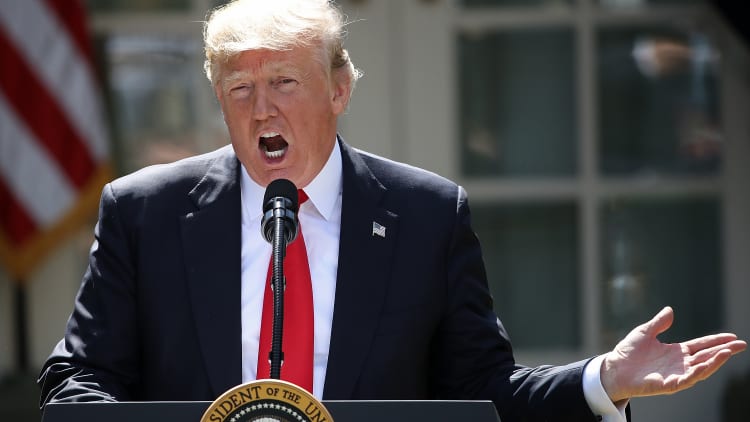President Donald Trump was "totally wrong" when he said shifting to renewable energy sources would starve parts of the country of electricity and plunge them into darkness, according to people who make a living studying energy.
Trump issued his warning on Thursday after announcing he would pull the United States out of the Paris Agreement, an international effort to mitigate the effects of climate change. Relying on renewable energy sources, he claimed, would leave the country with too little power to accelerate economic growth — or even go about business as usual.
"We need all forms of available American energy, or the country will be at grave risks of brownouts and blackouts," he said. "Our businesses will come to a halt in many cases, and the American family will suffer the consequences in the form of lost jobs and a very diminished quality of life."
I don't think any country would take what they do under that agreement to the point where their people are suffering ... Nobody was going to do that anyway.Ted Kurydirector of energy studies, UF's Warrington College of Business
But the University of Minnesota's Massoud Amin, who studies the electricity grid, said Trump is talking about problems that don't exist.
"In a nutshell, with all due respect to the president's office, he is totally wrong," Amin told CNBC.
"The challenges are not what President Trump is noticing," he said. "The challenges are how to upgrade the transmission and distribution networks" to make the U.S. electric grid flexible and resilient enough to accommodate renewable energy.
Inadequacies in the U.S. electricity grid already cost the economy $80 billion annually, Amin concluded in a 2011 white paper.

If the White House wants to prevent blackouts, it should focus on improving the physical infrastructure of the grid, Amin said. His research shows that would improve national security, create jobs and cut carbon emissions.
Utilities will still need to rely on other energy sources to provide electricity when the wind is not blowing and the sun is not shining, but power companies typically have reserve capacity equal to 15 to 20 percent of the total, said Ted Kury, director of energy studies at the University of Florida's Warrington College of Business.
Where future energy will come from, according to the Department of Energy
Much of the new capacity is coming from natural gas, which burns cleaner than coal and is replacing coal because it's cheaper.
"An all-of-the-above strategy is important, but this idea that we're anywhere close to a point where renewable penetration in the country is endangering the grid — I don't think that's a valid concern," he told CNBC.
Kury also noted that the Paris Agreement gives signatories a tremendous amount of flexibility and lacks mechanisms to punish countries that don't meet their targets.
"I don't think any country would take what they do under that agreement to the point where their people are suffering," he said. "So to me, [Trump's] statement is a bit of a straw man. Nobody was going to do that anyway."
The cost of boosting the grid
Making the grid stronger would require adding about 42,000 miles of high voltage wire to the country's existing 450,000 miles. That project would cost about $8.5 billion per year over 10 years but would generate up to 214,000 jobs, according to Amin.
Integrating smart technology like sensors would cost $17 billion to $24 billion each year over 20 years.
Those initiatives could be paid with the type of private-public investments Trump has endorsed and would allow the grid to draw up to half of all power from renewable sources, Amin said.


